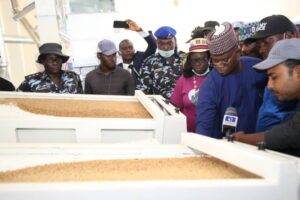How regulatory policies affect the growth of Nigerian telecom sector
THE regulatory atmosphere in Nigeria’s telecommunication sector may appear inconsistent and bullish in some aspects, particularly in the areas that affect business operations. However, the balance it creates between the government, operators and the users makes it the most unique in Africa. In one breath the operators are crying that some of the decisions are affecting their operations, in another, the regulators are making excuses for the operators’ poor services, trying to figure out ways the government can create a more conducive playing field for their businesses. For instance, the buzz word in the industry is that the $200m loss MTN posted in its last financial year was as a result of the unprecedented fine it incurred from the Nigerian Communications Commission, NCC. , MTN says it made $200 million loss in 2016, the company’s first big loss after suffering a huge fine in Nigeria and currency challenges in key markets. The Group, indicated that its financial results for 2016 reflect the most challenging year in the company’s 22-year history. This was after the company reported profits of 20.2 billion rand ($1.6 billion) before tax, the previous year. •Danbata Degenerating quality of service It further explained that overall performance of the company was hindered by lower than expected growth in South Africa and Nigeria as well as the depreciation of the Rand against the dollar and the continued impact of a $1 billion (950 million euros) fine by Nigerian authorities. Nigerian authorities had in October 2015 fined MTN for failing to disconnect unregistered mobile accounts in its network, and ordered it to pay $1,000 for each improperly registered SIM card. Although it is well within its right to sanction operators for violating laid down instructions, some opinions were that the fine as well as other forms of taxation may have backfired on the industry. In agreement with this, is the President, Association of Licensed Telecommunications Operators in Nigeria, ALTON, Mr. Gbenga Adebayo, who has always said that multiple taxations “will reduce the incentive for telecommunications operators to invest in the infrastructure improvements that are essential to improve and expand mobile/broadband connectivity across Nigeria.” However, the issue goes beyond taxation. Chief Technical Officer, CTO, at MTN Nigeria, Mr. Hassan Jamil, recently lamented that his company has been unable to catch up on investment in line with the demand for data and voice because scarcity of forex. Jamil, as well as representatives of other telecom companies at an interactive session with the NCC recently also blamed poor quality of service on incessant fibre cuts, community related challenges, scarcity of diesel to power base stations, Right of Way issues with different layers of government in the regions and sabotage at different levels. Corroborating the operators, NCC’s Head, Quality of Service Unit, Engr. Edoyemi Ogoh said that in October 2016, operators experienced 175 cuts across the nation while they recorded 180 cuts in November and 103 in December, 2016. There were 113 community issues in October 2016, 74 in November and 133 in December, adding that fibre cuts and community issues remain major drawbacks for QoS. Coincidentally, the regulator is also becoming increasingly worried by the degenerating Quality of Service (QoS) provided by Mobile Network Operators (MNOs) and other service providers. As part of measures to cushion the situation and ameliorate the recurrent inaccessibility to foreign exchange (forex) by operators, the Executive Vice Chairman (EVC) of NCC, Prof. Umar Danbatta has told the operators that the Commission had written to the Central Bank of Nigeria (CBN) Governor, Mr. Godwin Emefiele and he was favourably disposed to addressing the forex needs of the operators. He specifically said that as a follow up to the letter, the Executive Commissioner (Stakeholders Management), NCC, Mr. Sunday Dare had a meeting with Mr. Emefiele and extracted a commitment from him on how he hopes to address the forex needs of the operators. Danbatta said that since the NCC had declared 2017 as the year of the consumer, all hands should be on deck for telecom consumers to have a fresh lease of high Quality Service. The NCC, he explained, has put measures in place to check and monitor Quality of Service (QoS) on various networks “and we have sent this report to our task force on QoS and have been interacting with government at different levels as part of the measures to deal with the poor QoS” he added. Danbatta admonished the operators and co-location service operators to provide suggestions on how to address the situation. Earlier, NCC’s Executive Commissioner (Technical Services), Mr. Ubale Maska said, QoS has been a great concern as consumers inundate the Commission with complaints. “It requires everybody’s input if the situation has to be redressed, hence 2017 has been declared the year of the Consumer”. Improving the experience of the consumer NCC Director, Technical Standards and Network Integrity (DTSNI), Dr. Fidelis Ona, explained that the Commission was aware of some of the challenges which include Right of Way (RoW), Force Majeure, difficulty in acquiring new cell sites, multiple taxation and regulation, vandalism, power supply among others. In a related development, the NCC has also declared next Wednesday, March 15, 2017 to flag off the 2017 NCC Year of the Consumer Campaign. Director, Public Affairs, Mr. Tony Ojobo, said that the commission will use the flag off to unveil the strategy and series of activities aimed at empowering and protecting the consumers of telecommunications services in Nigeria. It added that throughout the year, improving the experience of the consumer will be the major focus of the Commission working with other key stakeholders vital to the success of the campaign.








